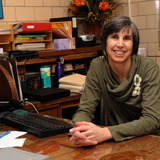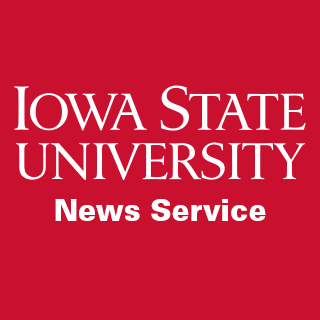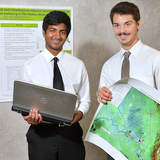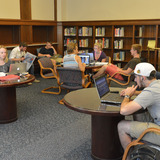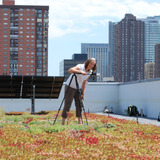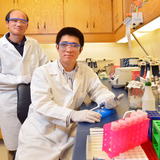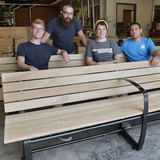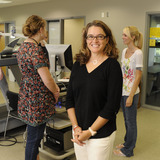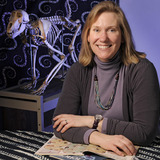News Archive
Monday, September 9 2013
-
American Book Award winner will speak on Islamophobia Sept. 18
Moustafa Bayoumi, author of "How Does It Feel to Be a Problem? Being Young and Arab in America" will speak on “Islamophobia: The Challenges of Being Muslim in America” at 6 p.m. Wednesday, Sept. 18, in the Memorial Union Sun Room. Bayoumi's 2009 book tells the story of men and women in their 20s to break down stereotypes and clichés about Arabs and Muslims. His lecture is free and open to the public.
-
Pulitzer Prize winner Eugene Robinson will give insider view of D.C. politics Sept. 18
In his twice-weekly column in The Washington Post, Eugene Robinson weaves together politics and culture to create compelling commentary on American society. The Pulitzer Prize winner will share his insight as the 2013 Chamberlin Lecturer at Iowa State on Wednesday, Sept. 18. His talk, “Who’s Up, Who’s Down and What’s Really Going On,” will be in the Memorial Union Great Hall. His lecture is free and open to the public.
-
Plant microbes have potential to unlock advances in agriculture, according to ISU microbiologist
A sharper focus on the billions of microscopic organisms that colonize plants and often share a symbiotic relationship with them could pay huge dividends for farmers by improving yields and lessening the need for costly fertilizers and pesticides.
-
Tuberculosis case identified at Iowa State; public health officials are investigating
Physicians at Iowa State University’s Thielen Student Health Center have diagnosed a student with tuberculosis disease through a routine screening required of all incoming international students. The student lives on campus, is being treated with antibiotics, and will remain isolated from the university community until public health officials clear the individual to return to class based on laboratory results.
-
Two Iowa State seniors present their research at an international conference
It's not the least bit unusual for Iowa State University researchers to present their work at academic conferences around the world. In fact, it's an everyday occurrence. It is unique, however, when the research presenters at an international scientific forum are undergraduate students. Global resource systems seniors Dylan Clark and Deepak Premkumar will be the only undergraduates presenting at the Living Planet Symposium in Edinburgh, Sept. 9-13.They conducted their research in Tanzania the summer following their sophomore year.
-
MEDIA ADVISORY: ISU professors available to comment on situation in Syria
MEDIA ADVISORY: Iowa State University faculty members are available to comment on possible U.S. intervention in Syria and the possible consequences as well as the challenges for the Obama administration in crafting an effective strategy for Syria.
-
What corporations can learn from Microsoft
A failure to recognize and adapt to changes in mobile computing is what ultimately led to the most recent change at the top of Microsoft. An Iowa State management professor explains how the problems are a reflection of the long-standing corporate culture at Microsoft that can serve as a lesson for all businesses.
-
Enrollment, student demand fuels growth for online courses at ISU
Instead of walking across campus to attend class in a lecture hall this fall, a growing number of Iowa State University students will log on from home, the library or even a coffee shop. The university continues to offer more online undergraduate and graduate courses to meet the demands of record enrollment and student preferences.
-
New course at Iowa State digs into green roofs
A new online course beginning Sept. 3 at Iowa State University will offer up the dirt on green roofs, the high-rise gardens that are fast becoming fixtures of U.S. skylines. The one-credit, eight-week course will cover the design, installation and management of green roofs and is open to anyone who registers online.
-
Iowa State researchers identify bacterial adaptation that can lead to kidney infection
Researchers at Iowa State University have identified a genetic process by which some E. coli bacteria adapt to the human kidney, a step that could lead to new treatments to stop urinary tract infections. In a new paper, a team of ISU researchers showed that uropthogenic E. coli are able to adapt by acquiring new traits through a process called two-component signal transduction.
-
Iowa State turns on ‘Cyence,’ the most powerful computer ever on campus
The most powerful computer ever on campus is now ticking off calculations and producing data. The $2.6 million computer, dubbed "Cyence," will advance 17 research projects from eight campus departments. Researchers from across campus are also pooling their funds to build a second high performance computing system.
-
Industrial design students produce outdoor benches for new university building
It's difficult to imagine college students working on a project for weeks after their class has ended. But the students in Will Prindle's summer industrial design studio wouldn't have it any other way. They not only designed the outdoor benches for Iowa State University's new Troxel Hall, which opens Aug. 26, they managed the entire production process from idea to product. It may not sound like much on the surface. Seven outdoor benches in a couple of months. How hard could it be, right?
-
New ISU study shows pregnant women need to move more
It may not be enough for women to spend just 30 minutes a day on a treadmill or elliptical if they want to manage their weight during pregnancy. Regular exercise is still recommended, but a new Iowa State University study found staying active throughout the day is more beneficial to limit excess weight gain.
-
Iowa State biologist: human menopause unique among primates
A new study from an Iowa State University biologist shows that menopause in mid-life is a uniquely human phenomenon among primates. The study found that female representatives of other primate species remain fertile throughout their lifespan, while human women typically experience declining fertility and reproductive cessation during their 40s or 50s.
-
Gift for ISU's Curtiss Hall renovation will name auditorium
A $2 million gift commitment from a retired Linn County farmer will support the renovation of Curtiss Hall at Iowa State University.


